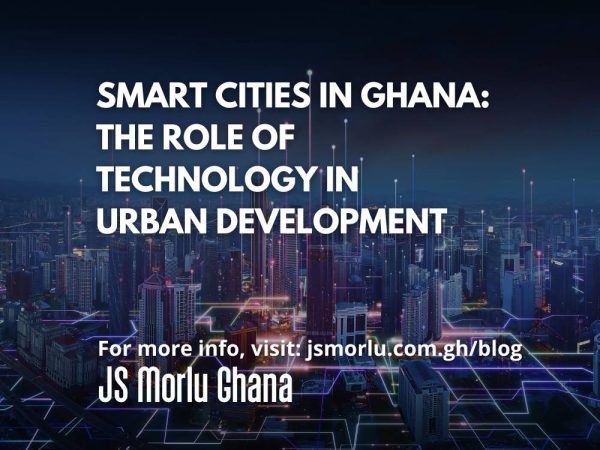The concept of “smart cities” is revolutionizing urban development across the globe, and Ghana is no exception. As the country embarks on a journey towards modernizing its urban infrastructure, technology is playing a pivotal role in shaping the future of its cities. From enhancing public services to improving sustainability, smart city technologies are set to transform urban living in Ghana. This article explores the key aspects of smart cities and the role of technology in driving urban development in Ghana.
What is a Smart City?
A smart city integrates information and communication technology (ICT) and Internet of Things (IoT) solutions to enhance the quality of life for its residents. By leveraging data and technology, smart cities aim to improve public services, optimize resource management, and create more sustainable urban environments. Key components of a smart city include smart infrastructure, efficient transportation systems, and advanced public safety measures.
Technology’s Impact on Urban Development in Ghana
1. Smart Infrastructure
One of the core elements of a smart city is its infrastructure. In Ghana, technology is being used to build and manage smart infrastructure that enhances urban living. For instance, smart grids and energy-efficient buildings are becoming more prevalent. These innovations help in reducing energy consumption and managing resources more effectively.
- Smart Grids: Smart grids are modernized electrical grids that use digital technology to monitor and manage electricity flow. In Ghana, smart grids can help in optimizing energy distribution, reducing outages, and integrating renewable energy sources. This leads to a more reliable and efficient energy supply for urban areas.
- Energy-Efficient Buildings: Smart building technologies include automated systems for lighting, heating, and cooling. These systems not only reduce energy consumption but also improve the overall comfort of building occupants. In Ghana, the adoption of energy-efficient technologies in new and existing buildings is a step towards sustainable urban development.
2. Efficient Transportation Systems
Transportation is a critical aspect of urban development, and technology plays a significant role in making it more efficient. In Ghana, smart transportation solutions are being implemented to address traffic congestion, enhance public transit, and improve road safety.
- Traffic Management: Intelligent traffic management systems use data from sensors and cameras to monitor traffic flow and manage signals. This helps in reducing congestion and improving travel times. Cities like Accra are exploring the use of these technologies to ease traffic jams and streamline urban mobility.
- Public Transit: Technology is also enhancing public transportation systems. Real-time tracking of buses and trains, mobile ticketing, and smart payment systems are being introduced to make public transit more accessible and user-friendly. These advancements encourage more people to use public transport, reducing the reliance on private vehicles.
3. Public Safety and Security
Ensuring the safety of residents is a top priority for any smart city. In Ghana, technology is being leveraged to enhance public safety and security through advanced surveillance and emergency response systems.
- Surveillance Systems: Smart cities use CCTV cameras and other surveillance technologies to monitor public spaces and detect suspicious activities. These systems help in preventing crime and providing real-time information to law enforcement agencies.
- Emergency Response: Technology also plays a role in improving emergency response times. Integrated communication systems and data analytics enable faster coordination between emergency services, leading to more effective responses to incidents.
4. Sustainability and Environmental Management
Sustainability is a key focus of smart city development. In Ghana, technology is being used to address environmental challenges and promote sustainable urban growth.
- Waste Management: Smart waste management systems use sensors to monitor waste levels in bins and optimize collection routes. This reduces the frequency of waste collection, minimizes landfill use, and improves overall waste management efficiency.
- Water Management: Technologies such as smart meters and leak detection systems help in managing water resources more effectively. These systems monitor water usage, detect leaks, and ensure that water supply is efficiently managed in urban areas.
5. Citizen Engagement and Services
Engaging citizens and providing them with easy access to services is another important aspect of smart cities. In Ghana, technology is being used to improve communication between residents and local authorities.
- E-Government Services: Digital platforms are being developed to offer government services online. This includes services such as paying taxes, applying for permits, and accessing public information. E-government initiatives make it easier for residents to interact with their local government and access essential services.
- Community Engagement: Smart cities use technology to facilitate community engagement and feedback. Mobile apps and online platforms allow residents to report issues, participate in surveys, and provide input on urban development projects.
Challenges and Future Prospects
While the benefits of smart cities are substantial, there are challenges to overcome. Issues such as digital divide, data privacy, and infrastructure costs need to be addressed to ensure successful implementation. However, the future of smart cities in Ghana looks promising as technology continues to advance and urban areas evolve.
Conclusion
The role of technology in urban development is transforming Ghanaian cities into smart, efficient, and sustainable environments. From enhancing infrastructure and transportation to improving public safety and sustainability, smart city technologies offer numerous benefits for urban living. As Ghana continues to invest in these technologies, the vision of smart cities will become a reality, paving the way for a brighter and more connected future.
